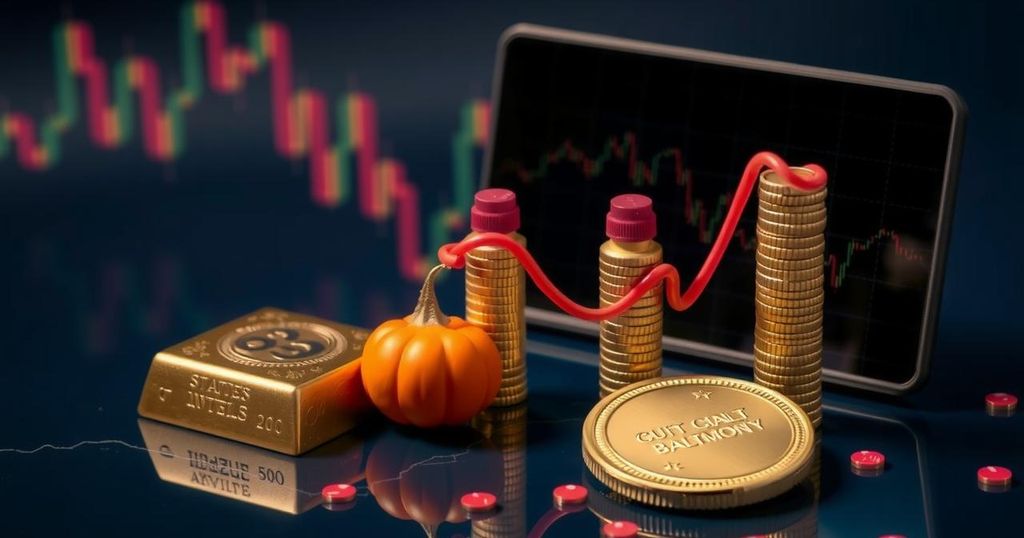Business
ARIZONA, ASIA, ATSUKO WHITEHOUSE, BIDEN, BITCOIN, BRUCE IKEMIZU, BULLIONVAULT, CONGRESS, CRYPTOCURRENCY, DONALD TRUMP, DOW JONES INDUSTRIAL AVERAGE, FEDERAL RESERVE, JAPAN, MARKET ANALYSIS, NASDAQ, NEVADA, NORTH AMERICA, STOCK MARKET, TRADING VOLUME, TRUMP, UNITED STATES, USA, WHITE HOUSE
Fatima Khan
0 Comments
Gold Prices Decline as US Dollar Surges Post-Trump Election
Gold prices fell to a four-week low, down 1.8% to $2,636 per ounce, following Trump’s election victory. The US Dollar reached a four-month high, impacting gold negatively. Meanwhile, Bitcoin soared to an all-time high and US stocks hit record levels, reflecting investor optimism about potential Republican policies. Upcoming US inflation data will be closely monitored for its impact on markets and the Federal Reserve’s decisions.
Gold prices fell to a four-week low on Monday, marking the steepest decline in five months, as the US Dollar surged to a four-month high following the election of former President Donald Trump. Despite the Federal Reserve’s anticipated interest rate reduction, gold’s value dropped by 1.8% to $2,636 per ounce, a significant decline from previous levels. This downturn occurred amidst a backdrop of rising Bitcoin prices, which reached an all-time high, and a rally in US equities that set new records. The bullish sentiment among investors was driven by the potential for a Republican legislative agenda which could favor the markets. Notably, Trump had campaigned on introducing pro-cryptocurrency policies, contrasting with the existing administration’s approach to alternative assets.
In response to Trump’s election victory and subsequent Republican control that includes both Congress houses, market analysts anticipated a fundamental shift in economic policies that would likely benefit investors, particularly in the equities sector. Stocks such as the S&P500 and the Dow Jones experienced substantial gains, signaling optimism about forthcoming economic growth initiatives. The volatility in gold prices is attributed not merely to the election outcomes but also to the rapid resolution of election uncertainties, as noted by Bruce Ikemizu from the Japan Bullion Market Association.
Globally, gold prices continued to experience downward pressure; in the UK and Europe, gold priced in British Pounds and Euros respectively fell to similar four-week lows. Meanwhile, in China—the world’s top consumer of gold—prices exhibited slight adjustments, reflecting divergent market conditions. The dynamics of local inflation in China, alongside fluctuating oil prices, compounded the complex landscape for precious metals. Upcoming high-profile US inflation reports are expected to further influence market sentiment as traders remain acutely aware of Federal Reserve policy adjustments that may arise based on evolving economic indicators. With a balanced perspective, some analysts suggest that without significant new developments, the gold market may trend towards stability amidst a lack of market-moving news.
The recent fluctuation in gold prices can be understood within the wider context of political and economic changes in the United States, particularly with the recent election results that have led to a notable Republican majority. As a traditionally safe-haven asset, gold often reacts inversely to strength in the US Dollar; thus, its decline is reflective of the currency’s rise amidst political developments. Additionally, Bitcoin’s surge juxtaposed with the struggling gold market illuminates changing investor appetites that increasingly favor cryptocurrencies amid legislative hopefuls for reform. The federal monetary policy, particularly in light of decreasing interest rates, also plays a crucial role in shaping investor expectations and sentiment in precious metals and equities alike. The global market dynamics, especially in relation to Chinese gold consumption and local inflation trends, have further complicated the landscape. Analysts suggest that understanding market behavior in response to governmental fiscal policies and consumer confidence is crucial for navigating the precious metals market, particularly for investors looking for signs of stability or growth. With the Fed’s next policy meeting on the horizon, the economic sentiments linked to inflation data will be keenly monitored.
In summary, the recent decline in gold prices amidst the backdrop of Donald Trump’s election has significantly influenced market dynamics, reflecting a broader shift toward risk assets such as equities and cryptocurrencies. The immediate market sentiment leans toward expectations for potential regulatory reform under a Republican-led Congress, driving up confidence in equities while impacting gold negatively. As we move forward, market players await critical inflation data, which will likely shape future Federal Reserve policies and the overall performance of precious metals and related assets.
Original Source: www.bullionvault.com




Post Comment